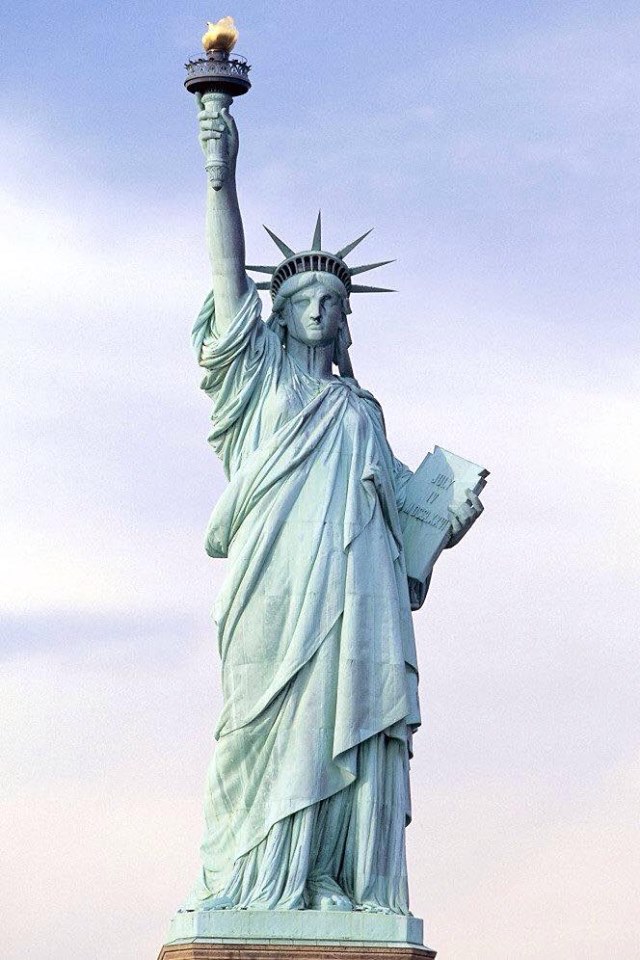
UPDATE:
In another interpretation of Emma Lazarus’ poem and in a fresh attempt to rewrite recent history, acting Citizenship and Immigration Services Director Ken Cuccinelli on Tuesday floated the following, when asked about the words “Wretched, poor, refuse…”:
Well, of course, that poem was referring back to people coming from Europe, where they had class-based societies, where people were considered wretched if they weren’t in the right class … And it was written one year after the first federal public charge rule was written.
He was not asked about another line in Lazarus’ poem: “From her beacon-hand Glows world-wide welcome…”
Original Post:
It is 104 degrees here in Texas – with the heat index it is predicted to “feel like” 112.
As I walked into our comfortable, air-conditioned home, I saw two men mowing lawns and trimming hedges in our community. I reached into our refrigerator and gave them a couple of bottles of cold water – the least I could do. “Muchas gracias,” they both said and, after taking a few sips, resumed their arduous work.
“So what?” some may ask.
I had to think of a video I saw a few weeks ago, of a border patrolman at our southern border kicking and destroying plastic containers of water left behind by considerate souls. Water that perhaps could have saved a life or two. The patrolman laughed about it.
“So what,” others may say.
As an immigrant to America, grateful for being admitted to this great country, for having been included in its society – no unreasonable conditions set — and for having been encouraged in the “pursuit of happiness,” I have a “soft spot” for other immigrants, both those “who have made it” and those who are still struggling to make it.
As such I have frequently told the immigration stories of friends and strangers and their ancestors, many of whom risked or lost everything to come to America. Several are contributors to and readers of this site.
Their and their ancestors’ experiences remind me of the words by CNN’s Chris Cuomo one year ago in response to Trump’s anti-immigrant policies and actions.
Talking about his immigrant ancestors, Cuomo said:
My ancestors on both sides were almost completely uneducated, illiterate and in no way high skilled…They served in the military, they dug ditches, did construction, worked their way into businesses, build homes of their own, they put their kids into public education.
Cuomo went on to describe how, one generation later, his immigrant family included successful doctors, lawyers, governors and, yes, “an anchor at CNN.”
“My story is common. So my argument is this. How many of you would be here, if America was like what Trump wants it to be now? I wouldn’t. Would you?” Cuomo then asked.
This week, the Trump administration unveiled new, radical “public charge” immigration and naturalization regulations that not only vastly change who will be allowed to immigrate to America, but will also make it more difficult for legal immigrants already here to continue on their path to obtain their “green cards” and to eventual citizenship.
The regulation could force millions of low-income families to choose between government assistance and permanent settlement in the United States. Advocates fear it could ultimately restrict children’s access to food and health care.
The move will mainly affect legal immigrants and their families, since undocumented immigrants are not eligible for most federal benefits.
If and when the new rules take effect in October broadly expanding the definition of “public charge,” immigrants “can be denied a green card if they have used, have qualified for or are likely ever to use food stamps, housing assistance or Medicaid.”
What happened to those immortal words inscribed at the base of the Statue of Liberty that, for more than a century, have proclaimed:
Give me your tired, your poor, Your huddled masses, yearning to breathe free, The wretched refuse of your teeming shore, Send these, the homeless, tempest tost to me, I lift my lamp beside the golden door.
Two years ago, immigration czar Stephen Miller had a proclamation of his own.
When pressed at a White House briefing whether Trump’s immigration policy was in keeping with the spirit of those words, Miller angrily proclaimed “that the sonnet was ‘added later’ and therefore, does not reflect American values towards immigrants.”
Since Miller’s efforts to obfuscate the history and intent of the words on the Statue of Liberty have failed, the Trump administration has come up with a new strategy: Just rework the darn poem!
On Tuesday, Ken Cuccinelli, acting director of U.S. Citizenship and Immigration Services, when asked whether Lazarus’ words at the statue’s base remain “part of the American ethos” in view of Trump’s new draconian immigration rules, did exactly that. “They certainly are [part of the American ethos],” Cuccinelli said and gave the new Cuccinelli-Trump version: “Give me your tired and your poor — who can stand on their own two feet and who will not become a public charge.”
What can we expect to happen to the Lazarus sonnet when the next Trump anti-immigration rule is announced? Perhaps an acid wash of the entire poem?
Will some still say “So what”?
















